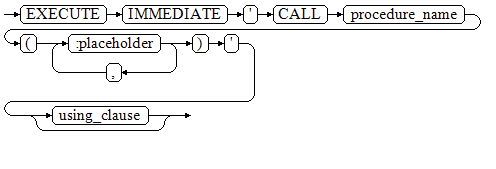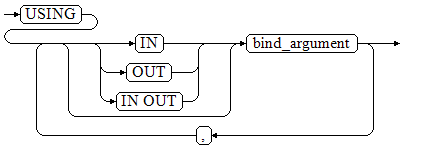Dynamically Calling Stored Procedures¶
This section describes how to dynamically call store procedures. You must use anonymous statement blocks to package stored procedures or statement blocks and append IN and OUT behind the EXECUTE IMMEDIATE...USING statement to input and output parameters.
Syntax¶
Figure 1 shows the syntax diagram.

Figure 1 call_procedure::=¶
Figure 2 shows the syntax diagram for using_clause.

Figure 2 using_clause-3¶
The above syntax diagram is explained as follows:
CALL procedure_name: calls the stored procedure.
[:placeholder1,:placeholder2,...]: specifies the placeholder list of the stored procedure parameters. The numbers of the placeholders and the parameters are the same.
USING [IN|OUT|IN OUT]bind_argument: specifies where the variable passed to the stored procedure parameter value is stored. The modifiers in front of bind_argument and of the corresponding parameter are the same.
Examples¶
--Create the stored procedure proc_add:
CREATE OR REPLACE PROCEDURE proc_add
(
param1 in INTEGER,
param2 out INTEGER,
param3 in INTEGER
)
AS
BEGIN
param2:= param1 + param3;
END;
/
DECLARE
input1 INTEGER:=1;
input2 INTEGER:=2;
statement VARCHAR2(200);
param2 INTEGER;
BEGIN
--Declare the call statement:
statement := 'call proc_add(:col_1, :col_2, :col_3)';
--Execute the statement:
EXECUTE IMMEDIATE statement
USING IN input1, OUT param2, IN input2;
dbms_output.put_line('result is: '||to_char(param2));
END;
/
-- Delete the stored procedure.
DROP PROCEDURE proc_add;